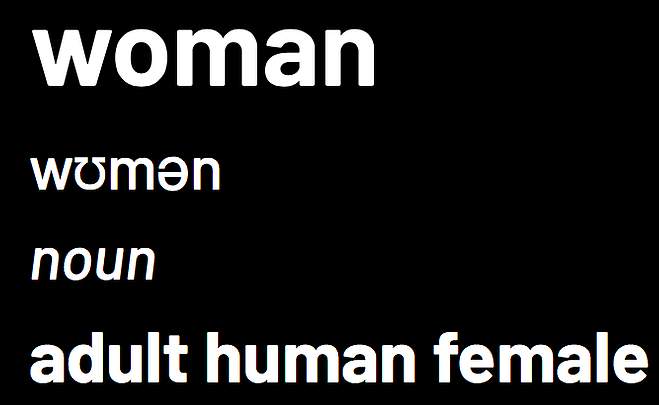Dear bright-eyed, compassionate, intersectional feminist,
You don’t know me, and more than likely you dislike me. You think I’m mean, selfish and rude, possibly narrow-minded and old-fashioned, and at worst, a transphobic, evil, paranoid old woman. You want to save the world, you never want to be mean, or even come across as being selfish to others. You want to solve everyone’s problems, you sympathize when people ask you, ‘what about male suicide’ and you respond apologetically and with concern. You feel it is only logical – after all, aren’t all problems interconnected? How can we expect compassion from people not like ourselves if we do not show it to others who aren’t us?
And so, you’ve decided that, unlike older women who fought for their specific group, who may have seen men as a threat, that you would fight for all. The depressed men, the ones left behind – and above all, the class of people who aren’t ordinarily regarded as women, but who want or seek to be. You look around you, at a society built along rigid lines, for only two types of people, and it angers you to see how people who don’t fit in one of those are treated. You have a point – this world isn’t built for the out-of-pattern, the unique. It is built on simpler, direct ideas about our existence, and it does end up disadvantaging a lot of people whether they like it or not, and through no fault of their own. So there is this burning passion in you to take it all apart, to reject everything as a rigidly enforced, oppressive structure – more so, you cannot find it in yourself to say no to these people, the ones that society has long branded as misfits and curiosities, a spectacle to analyse but not humanise. Above all, you feel the need to be kind and compassionate, warm and welcoming. So when women like me insist on reserving the word ‘woman’ for a specific class of people, who are, in fact, female, irrespective of the validity of the arguments, it enrages you. “How could you” you yell. “Can’t you see these people are suffering?! Is it really important to fight over a word?”. “What’s in a word!” you may feel compelled to scream. Acceptance and love and endorsement of the needs and demands of the oppressed is all that matters, in your view, so how does it matter what words people use to describe themselves, especially when they’re already disadvantaged and oppressed? When I say – “woman means adult human females, the end” you simply cannot countenance my insistence on what seems like semantics, when there are larger issues at stake. You convince yourself it is because I must hate trans people, that the only reason I would do so is so that I can ‘debate’ their very existence and lives, that I do so to cruelly harm them and invalidate them – in a cruel twist, I am now your worst enemy, the shadowy old-timer who wants to ‘police’ womanhood and exclude someone whom we should feel sorry for.
So let me explain why we do so, dear intersectional feminist. The world is not simple, however much your optimism and passion may want it to be. We do not change situations and disadvantages by merely wishing it so, or even because we dearly want it to be so. Brushing aside logical and reality-based objections may feel good in the pursuit of a higher goal, especially when you think they’re minor bumps. But very much like our species collectively polluted the oceans, small cracks in the logic of a movement will progressively and successively widen, until the entire ideology collapses in on itself. Especially when you’re fighting against the tide, when you’re fighting for marginalized and disadvantaged people, like any other endeavour, you have to be really really careful to make sure you cross your Ts and dot your Is.
What do I mean by this? If you’d read some of the greatest work on civilizational progress, on our evolution as a collective, you will realise that one of our largest leaps in development is through the power of language i.e the power of being able to articulate and say what we are thinking. Much like every great building relies on a steady cornerstone, our society relies on language – communication – and meaning – to make sense of the world. Every word I write here has a meaning, and if it doesn’t, or if I’m unclear, we misunderstand each other, and understanding as well as communication becomes impossible. Consider then, what you’re risking by blithely dismissing millenia of linguistic development to satiate the desire to feel like you’re on the side of oppressed groups – are you really?
“But so
what if language developed the way it did”, you may ask. “It can
change,” you confidently assert, – and now we’re changing the meaning of
the word woman. How does it matter?” You throw at me. “Why mustn’t, you
argue, “an old meaning be rejected in favour
of a new one that makes some people happier?” Here’s why. Nouns – or
the names of things, provide the starting point for how the thing is
perceived, treated, and where it falls in our perception of the
universe. A flower is a different thing from plastic, a root is
different from a flower – if we rename a root as a flower, we understand
its role and function differently, and could very well end up poisoning
ourselves. In the same way, how a group of people are named is crucial, indeed vital to their status in society. If you cannot clearly name them, you have no idea what is happening with them, or to them.
Let’s
look at some examples – for as long as modern nation states have
existed – we have recorded the humans as men and women, boys and girls.
If the word ‘woman’ now refers to anyone who says they are a woman, feels like a woman, presents like a woman, irrespective of objectively determining whether they qualify to be considered in that category:-
Crime statistics become massive misrepresentations of reality. It is crucial to protect everyone that
we know relevant characteristics of people committing crime – sex has
always been relevant in crime since men and woman commit crimes
differently, in differing circumstances. While globally, men I.e
the male sex of humans have committed, and continue to commit over 90%
of all sexual violence, more than 95% of all sex trafficking crimes, redefining the word ‘woman’ to include people who are not female messes up our statistics in unimaginably terrible ways. Even small variations, where a person who is actually male, is recorded as a female crime or treated as such, is of enormous danger – both to women in the criminal system, as well as for crime and social policy.
Maybe
you dislike this implication, that somehow the male or female aspect of
a criminal is important. Yet, it is. 10,000 years of history does not
lie, and we are simply not at a point where we can dismiss relevant
facts. This is not out of hate, prejudice, or bigotry towards what
people who are marginalised – it is a reflection of a reality. Adding more details to the statistics to reflect marginalisation
and to provide more context to the background of a criminal is one
thing – redefining a foundational term that describes 51% of the species
is another.
Let’s
forget about crime for a moment – what about medical and health policy?
Policy is fundamentally reliant on statistics, health policy requires
accurate biological statistics to assess the allocation of resources,
and the incidence of medical conditions. If the word ‘woman’ or ‘man’ is
expanded to include people who are not of the female or male sex
respectively, and replaced with, persons or humans, you distort
statistics indelibly. Consider these two statements ‘1 in 7 women suffer
from endometriosis’ versus ‘1 in 7 persons suffer from endometriosis’.
The first is 1 in 7 of 51%% in a country, the second is 1 in 7 of all
people. Consider the implications for breast and uterine cancer research
(affecting adult women) , vs that of prostate and testicular cancer research (affecting adult men).
Lastly, dear intersectional feminist, maybe you didn’t notice, maybe you thought it wouldn’t make a difference, but redefining adjectives, and adverbs and insults, is very different from redefining nouns that are used in every policy document, every write up, every statistic, every law since the beginning of modern civilisztion. If the words ‘women and girls’ is no longer limited, no longer restricted to a group that you can verify as being that group, how will you calculate women’s representation? Women’s representation in Boards, women as CEOs, the first woman president, women’s representation in Parliament and Local Government, in publicity panels and in the workplace? What about awards, women’s awards, and scholarships – set in place to uplift the half of the species that have been brutally subjugated? How will you identify whether they belong to the group that has been subjugated for all of history or not?
Wait, hang on though, I can hear you saying – you point out that the people claiming to be ‘women’ without being female, are a tiny number, a group that need our help desperately. They also suffer from similar oppressive forces, do they not deserve representation in Boards, CEO count, Parliament and Congress as well? So what if, you may demand, a few of them aren’t actually female? They are also oppressed, so can’t we share a little bit? Let me ask you this – at what point do you think the replacement will be contained? Is it when, on a panel of 9 people, 5 are men, 2 are persons who state they feel like women, and 2 are female women?
Is it when, in a constituency with 60% women voters, and a quota for a women politician, the constituency is represented by a person who states that they’re not female but presents as a woman? What is the point of the representation? To have someone who looks like it, or who is it? Is it when it is pointed out that ‘female sexual crimes’ is rising by 30%, but when you look closely, you note that the crimes were committed by a person with a penis? How do we refer to this person? Do we even have a shared understanding? Is there a point where you think there is a problem?
The examples I’ve mentioned here are just the tip of the iceberg, the most glaringly obvious in a spiral of rights, entitlements and affordances on which our society is based. We haven’t even begun to touch on the topic of women’s and girls’ sport where the annihilation of human female beings has occurred almost overnight. Maternity provision, insurance, scholarships, scientific data collection for other products – the entire edifice of your mere socio-legal existence will be eroded.
But more so, dear liberal intersectional feminist, can you answer me this – why is it necessary, for a group to be protected, to be safeguarded, to have legal protection against discrimination in the workplace, criminal law or housing, that the foundational, hugely impactful terms describing other groups must be changed? Why do you need the term that circumscribes and categorises other groups to be redefined and expanded, for the first group to get rights, or to be treated well? Did we fight for black rights by claiming they’re the same as white? If so, what’s the point of Black pride? Can you think of any other instance, any other movement for a disadvantaged group that relied on redefining other groups, and creating confusion, to gain rights, protection and status? Why do you believe that to gain rights, decent treatment, and protection in society, a person presenting according to the typical looks of the opposite sex – must be considered as part of that sex to get rights and protection? Isn’t your goal to create a society that allows for more than the sex binary to be influential in law and society?
You won’t find one. So tell me, liberal, intersectional feminist, why do you think it is necessary in this case? Why can you not fight for, stand for, and protect people for who they are – trans, queer, gender non-conforming – without forcing the redefinition and encroachment on another group? There are enormous ripple effects to this, in law and society that you haven’t carefully considered, maybe because you believe it can be willed away by wanting justice and a better society. It cannot. Or maybe you just feel so angry on behalf of oppressed people that you do not want what you perceive as small inconsistencies. They’re not small – they’re foundational. The impact is not one that most of us can see or anticipate, because this has rarely happened before. But consider, for a moment, why you wish to reduce a word to being meaningless, instead of valuing precision, and whether that is actually helpful to the cause you feel so strongly about.
I don’t expect you to be convinced by this, and I’m sure you’ll have various other counter-responses, focusing perhaps on the existence of intersex conditions and solidarity among the ‘oppressed’. But I ask you to consider this – that women who fought for women’s rights, for labour rights, working hours, and LGBT recognition, did not wake up and decided to hate another group, or become rigid about semantics – but rather, that we are aware of implications easily unnoticed.
Yours,
So-called old-fashioned Feminists – the ones who remember history, and the importance of limitations.








Posted by Danielle
7 June, 2020 at 5:56 pm
Dear Beatrice, I must say I came very interested in what you wrote because for people to form an opinion it must have both sides of the story, that's well known. I can say you didn't disappointed me. I felt strong arguments with a lot of information and for that I respect you. Now, let me give you in a few words this side of the story so you maybe can respect me as well: 1. Woman? That's easily understood as who-man, that itself deserves a change if you really want to go to the deepest of origins, don't you think? 2. About criminals and damaged people, they already have definitions as consequence of their actions triggered by causes in every case, regardless of any gender, I think is unfair trying to relate them as a consequence of the other. 2. I can give you an easy solution for everyone about an specific group within the same gender, without the necessity of any exclusion, just add the word "cis" and that's it, now you have pointed the difference while being part of an integration movement. 3. Awards? Achievements? Who's taking them from you? at the very least they're being added, spiced up, expanding the capacity of women to reach new heights. Why does people need to exclude in order to "preserve", that's the main problem in our world, you and I know that, is everywhere and obviously is not working, the facts are proof of this. I deeply believe the day when we as humans realize that is not by excluding but including in a healthy way, would be the day of our second awakening as civilization. Man and woman are not names, but definitions of a male and female form, what we're implying is those definitions are still the same, but regardless if you are cis or transitioned towards it. There's no taking, is just... Adding. God bless you